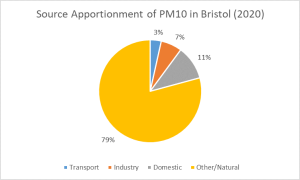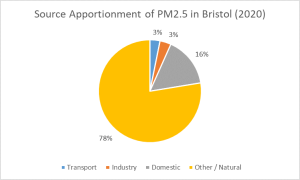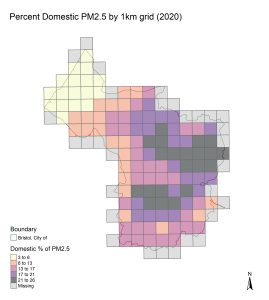The government estimates that burning wood and coal in our homes is the largest contributor to national particulate matter emissions at 38%.
The Department for Environment Food & Rural Affairs (DEFRA) publishes maps of particulate matter concentrations across the UK. These maps provide a conservative estimation of air pollution concentrations and its sources.
DEFRA’s 2020 map for particulate matter in Bristol shows that people burning wood and coal at home are a significant source of particulate matter pollution in the city – 11% for PM10 and 16% for PM2.5.
Other and natural sources of pollution such as secondary particle formation and sea-salt are the largest contributor to air pollution. However, these pollution sources can’t be controlled by the council and their concentrations cannot be influenced by people changing their behaviour.


The map below shows the distribution of the proportion of domestic PM2.5 as a percentage of the total for 2020.

In 2020, Bristol City Council produced a report on the impact of solid fuel burning in Bristol.
The report found people burning wood contributed to 241-791 tonnes of PM10 and 235-772 tonnes of PM2.5 and coal burning contributed to 20-22 tonnes of PM10 and PM2.5 each in 2014.
The report also indicated a significant growth in the numbers registered wood burning installations in Bristol. Whilst there were 120 wood burners installed in 2007, this increased to 901 in 2017.
Emissions from solid fuel burning mainly impact on concentrations of particulate matter. In terms of the health effects, exposure to PM2.5 is the most serious and harmful, although nitrogen dioxide and other pollutants all add to the burden of disease, to a greater or lesser extent.
Current evidence suggests there’s no safe limit for exposure to particulate matter pollution and that people burning wood and coal at home are a major cause of air pollution in Bristol.
